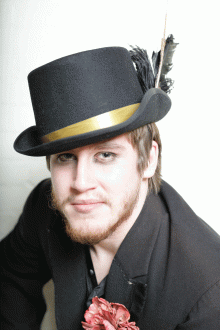Once a season, the School of Drama undergraduate actors take to the main stage. This season they are led by Tony-nominated guest director Wilson Milam in Václav Havel’s The Beggar’s Opera. School of Drama and Undergraduate Theater Society (UTS) veterans Hannah Ruwe (UTS Executive Director) and Spencer Hamp (UTS Creative Development Director) along with Esther Hafner, on a year-long exchange program from Germany, share their thoughts on working with Mr. Milam, UTS versus the school’s main stage, and the ups and downs of being a drama student at a large university.
How is this play different than your other experiences with UW productions, both main stage and the Undergraduate Theater Society?
Spencer: Every production is so different. Each requires a different process depending on the story you’re trying to tell and the theatrical devices the show uses. We’ve spent all our time so far at the table, tracking the logic and the reasoning in the text. I’ve never worked on a show where the text is not just what the characters are saying, but also the plot. Not a lot is happening in a formal sense – just a lot of conversations that are really tricky to get a hold of. We’re doing textual analysis and that’s the most integral part of this process.
Esther: I don’t think I’ve ever spent so much time at the table. It’s a totally new approach to get into story.
Hannah: You could argue that the rehearsal process for last year’s Once Upon a Time 6x in the West was the exact opposite because the script was still in process. We were up on our feet from the beginning.
How is working with a guest director – and Wilson is particular – different than working with a faculty member?
H: It’s a really good exercise in stretching yourself because you definitely bump up against those moments where you wonder if the tools and the skills that you have will actually allow you to do the things you’re asked to do. You might not, but more importantly you might figure it out and then something great will happen.
S: Wilson is equipping us with skills that we can use when we don’t have a director who is as careful and cares as much about his actors as he does. He’s a self-proclaimed actors’ director. I would agree. He’s willing to spend the majority of his energy working with us.
And for you, Esther, how is this experience at an American university different?
E: Everyone has a different approach to story, and there are some directors who give you a lot and some directors who don’t. It always depends on the person and how you connect. Humans are all different. I don’t think it’s a national thing. If you’re open to Wilson’s techniques and really jump in, I think you get so much.
How are main stage productions different than UTS productions?
H: UTS is a completely student-run organization. We acknowledge that we are students and we are still in the process of discovering our own identity as artists. We’re also more financially limited, so we make a lot with a little.
S: I feel like they are both necessary. They both serve the function of education in practicum. There is a safety net with School of Drama productions, but for the most part we’re emulating a professional company and it gives us the skills to interact with professional stage and costume crews. UTS is a lot scrappier, but both UTS and School of Drama really strive to foster artistic leadership and initiative in students.
H: UTS is also a really important institution to have in that there just aren’t many environments where it is totally fine to fail. There aren’t consequences for failure. It’s totally acceptable.
E: It’s a really safe place to fail and to explore.
What is it like to be a drama student within the context of a large university with many priorities and a diverse array of students that it serves?
H: Sometimes it is easy to feel a little bit forgotten. I think of us as the underdog department. We have to work hard to make a name for ourselves.
S: It would be nice to foster a supportive ethic embodied by the whole community – for the School of Drama and UTS to be household names, but we just don’t live in a community where theatre is a normal part of anyone’s routine.
H: I’ve had a couple of experiences where I’ve sat in the audience and heard people behind me talking about other plays they went to see, and they weren’t traditional drama students, and they seemed genuinely excited about the shows they’d seen. That’s awesome because then you know the work you’re doing is reaching a new demographic.
What do you see as the positives of attending a large, research university?
S: A liberal arts education is super necessary to my study of theatre. You can’t be an artist without having an awareness of the whole world around you. We take history classes and think critically about context and text. This program makes you a smart actor, not just an actor who can present something.
H: We get the best of both worlds because our department is self-contained within the walls of Hutchinson, so it has a conservatory feel, but we get all the advantages of a large university. A lot of us are double-majors. We have our drama life and then we step off into the rest of campus and experience something else.
S: You can’t find the answer to every problem in the studio. You just can’t. You have to leave the studio and sit in a Sociology, or Psychology, or CHID lecture, and find your answer somewhere else.
E: It’s so important not to be just trained in theatre and drama. Especially for me because I tend to be very much in my head and other classes give me a good opportunity to think outside that world going on inside my head – outside of plays and stories.
Esther, Hannah, and Spencer will all graduate this June with two degrees – History and Drama for Esther, French and Drama for Hannah, and Sociology and Drama for Spencer. Before saying farewell to UW, Hannah and Spencer will travel with Professor Andrew Tsao this summer to the Edinburgh Fringe Festival. Be sure to catch them on stage in The Beggar’s Opera, running April 23 through May 4.


